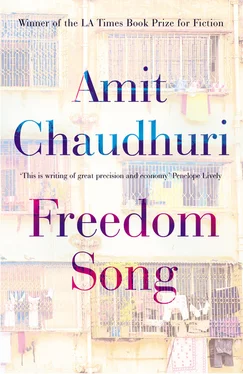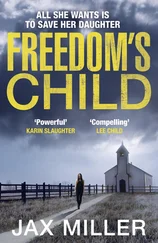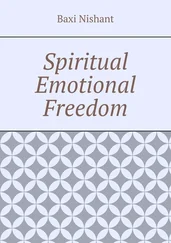There was a loud scraping movement upstairs, furniture being moved, and then the sound of feet running. What was happening?
She herself was a bundle of fears she had never grown out of. Doctors, medicines, TABC injections; all these things she ran from, running literally from the last, climbing up the stairs with the sari pulled round her ankles when the health worker used to come on a visit, chased by her children, laughing and weeping at once; thus she had rarely been vaccinated, but had rarely fallen ill as well. This is what perpetually puzzled her sons; that the prospect of contracting a disease should cause her less fear than the simple pin-prick of an injection. For this was the only time — the visit of the health worker — when they saw her frightened and agitated. Her general good health had been cause for some contentment. But she had sensitive ears, and they ached at times. The imbalances of the menopause caused one side of her face to swell occasionally. Her childhood had been spent in the then prosperous area of Shyambazar in North Calcutta, she the third youngest child of a family of three brothers and four sisters, her father doing a very successful business in cheap detergent soap. Her mother had died when she was six, but it was strange to think that she felt she knew her in a way; her picture now hung next to her father’s in the house.
Years had passed, and she was left here, suddenly awake, half listening to the traffic outside.
She was closest to the sister immediately younger than her — Reena — and in an album there was a series of silly photographs taken on that day, one and a half years before she was married, by Chhorda (‘Right, stand together, you two!’) when they had dressed as men, especially for these photographs to be taken, Reena as a police inspector, wearing a real khaki uniform with a cap and a baton, she just as a civilian, both with ridiculous moustaches etched above their lips, and with serious expressions full of suppressed smiles. They, Abha (which was her name) and Reena, were sixteen and seventeen then, and neither had really known what it was to be either a man or a woman; they had posed on the terrace with the other old buildings in the area behind them. At the age of eighteen she had got married.
Ah, her youth, her youth. Her children would never know it.
Then another life began for her, in another house. She found Bhola full of opinions about what was Art and what was not, and about politics; and, vexed as she was by this man, a secret affection grew for him that was inseparable from the exasperation she felt. Life changed; their children grew up; but he did not change. And in the inconsequentiality of such emotions lay a specialness, that it did not matter to the world or to anyone else what his opinions were, as if there had been, alas, a pact between her and him to see what he was really like. Yet what arguments had to be tactfully averted! She had been a fan of Uttam Kumar, but Bhola, she found, thought he was a ‘bad actor’ and had a ‘stupid face’, and these revelations came as a shock and at first she could not possibly understand how anyone could think these things about Uttam Kumar. Nevertheless she tried to understand. Music he took very seriously, more seriously than she had ever seen anyone take something like music before — after all, what was it but music? — and he spoke of tunefulness and bad singing. He spoke of the great singers he’d heard when he was a child. All this to her was an alien idiom; thus she never told him, until many years later, that she had learnt the Hawaiian guitar for two years before her marriage, and could just about play three or four Tagore songs like ‘It is your beginning, and my end’ and ‘Are you only a picture?’ on it.
How was one to speak to such a man? And such an impractical man: it was almost as if he’d made whatever he wanted of their lives, and she’d sat back and allowed him to do it. At first they used to have arguments. It took years to just properly understand each other. By that time, one part of life was finished.
Upstairs, it was quiet again; and she wondered, for a moment, if everything was all right. But she was reassured that they were at work. Sometimes they were loud as demonstrators on the street, and at other times secretive as thieves. There was no telling when they were excited and when planning something quietly.
‘Borda doesn’t live far from here, does he?’ Returning from the nursing home three days later, Mini asked this question. It was put forward shyly. For it was like something of a holiday for her, to be in the cool, neat, constricted South; these little trips to and from the nursing home were outings, and even now had the air, for her, of freedom. And each new day with Khuku was a measuring out of time; she, Mini, must go back before long, but to be in this part of the city was to explore a world and witness those who had been changed completely.
‘Very near here,’ Khuku revealed. ‘It’s round the corner, isn’t it?’ she asked Mritunjoy. Not far away was Golf Green and that block of flats.
Mritunjoy mumbled words that sounded like ‘Yes, mashima.’
Borda, Khuku’s elder brother, had stopped going out since last year. Any visit to the little flat in Golf Green was thus welcome. There were lapses in his memory these days. This had happened after the pneumonia infection, when he’d been on the brink of moving across to the other world, and had just managed, in a nursing home in Mandeville Gardens, almost against his will, to come back. Thus, he might not recognize Mini when she visited him today, though she had visited him in the autumn only a year and a half ago, when he’d been healthy. So this is what it came to, those years in Sylhet. He used to wander about Sylhet town with an umbrella, to protect his complexion; dispensing with his studies, he used to gaze softly at girls, some of whom were Khuku’s friends. Khuku suffered as her friends, unaware he was her brother, made satirical comments on his tender appraisal. Then he had got tired of that life, and he’d demanded of his mother when he was twenty-six years old, ‘Ma, can I get married now?’
But there were, these days, moments of clarity. For instance, recently, when his daughter Beena had been speaking about Bhaskar with her mother, he’d said, ‘What — Bhaskar? He’s become a Communist, hasn’t he?’ Then he’d gone into a sort of contemplation.
There was a time when he had a great deal of love for his nephews and nieces; but that was obscured now, absolutely, by a veil of silent but complete obsession with personal health and hygiene. A little over a year ago, his only grandson in Jodhpur Park had died at the age of six of a rare form of cancer; yet at the shraddh ceremony for the child, all Borda could worry about was whether he would be able to have his expected meal at the usual time. At times, now, he sat on his bed ruminating. A visit, no matter who it might be, made his eyes light up with happiness. The words he said were hardly audible, because his voice had become soft. Golf Green surrounded him with its identical verandas.
Golf Green. A maze of houses, predominantly off-white and red, with scattered islands of green, dull façades, one lot of houses hiding from another. One could hardly ever quite remember the way, and Khuku had to rely on the man who had a small makeshift stall for ironing clothes as her landmark.
Very small children and cats sat in the balconies.
They came to the staircase on whose side was imprinted, in the style of graffiti, the letters by which one identified Borda’s building.
The two got off from the car. Mini walked towards the staircase.
They had not been expected; Borda’s wife, this old, faded woman, in fact, had just begun to prepare lunch.
Читать дальше












